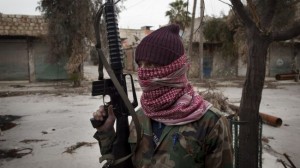 (Reuters) - Syrian Kurds are demanding their own delegation separate from both the government and opposition at next month's peace talks in Switzerland aimed at halting the conflict in�Syria, Kurdish political leaders said on Thursday.
(Reuters) - Syrian Kurds are demanding their own delegation separate from both the government and opposition at next month's peace talks in Switzerland aimed at halting the conflict in�Syria, Kurdish political leaders said on Thursday.The Kurds say they need independent representation because their demands in negotiations over Syria's future are distinct from those of the government or the opposition Syrian National Coalition that seeks to end President Bashar al-Assad's rule.
"The Coalition are no different from Assad's Baath party rule when it comes to their position on the Kurds. They do not recognize the rights of Kurds to live on their land with recognition of their basic rights, including the right to administer their own region," said Abdelsalam Ahmed, a leading figure in the Democratic Union Party (PYD).
The push for a more autonomous role for Kurds in�Syria�has unnerved regional powers such as neighboring�Turkey, already dealing with such demands among its own Kurdish population.
Syrian Kurdish parties have themselves been deeply divided for months by an internal power struggle. They are currently holding talks in the Iraqi Kurdish city of Arbil.
Kurdish leaders, speaking from Arbil by phone, called their demand for a united delegation a positive step toward healing rifts and strengthening the Kurdish position in�Syria.
FEDERAL SYSTEM
The Kurds, who span Syria,�Turkey,�Iraq�and�Iran, are one of the world's largest ethnic groups without a country. In Syria they make up about a tenth of the population and have suffered severe repression under four decades of Assad family rule.
Syrian Kurdish groups are calling for a federalized system of governance that would give them greater autonomy in regions where they are a majority. They also want their language, once banned in public, to become an official language.
Kurdish officials said they would seek approval to send a separate delegation to Switzerland from the�United Nations�and the United States and�Russia, which have been the driving force behind the planned talks, known as "Geneva 2".
"We have agreed to a shared delegation made up of the main Kurdish parties. We won't finalize the details until we can talk to foreign powers and the�United Nations�to see if they will accept," said Abdelhami Darwish, head of the Democratic Progressive Party.
PYD leader Abdelsalam Ahmed said Kurdish leaders would put their case to Lakhdar Brahimi, the international envoy on Syria, but would also seek to convince the United States and Gulf Arab countries, which have backed the rebel fight against Assad.
The Kurdish demand could complicate preparations for the long-delayed peace conference due to open on January 22. Brahimi has set a December 27 deadline for delegations to be named.
"Russia�is willing to accept a third bloc for the Kurds but it is other powers, particularly America, which insist on a two-party negotiation," the PYD's Ahmed said.
"If they insist on a single umbrella opposition group, we will go with the opposition as part of a unified Kurdish legal council within it, but we strongly believe in the principle that the Kurds deserve their own representation."
By Reuters
The Iran Project is not responsible for the content of quoted articles.










